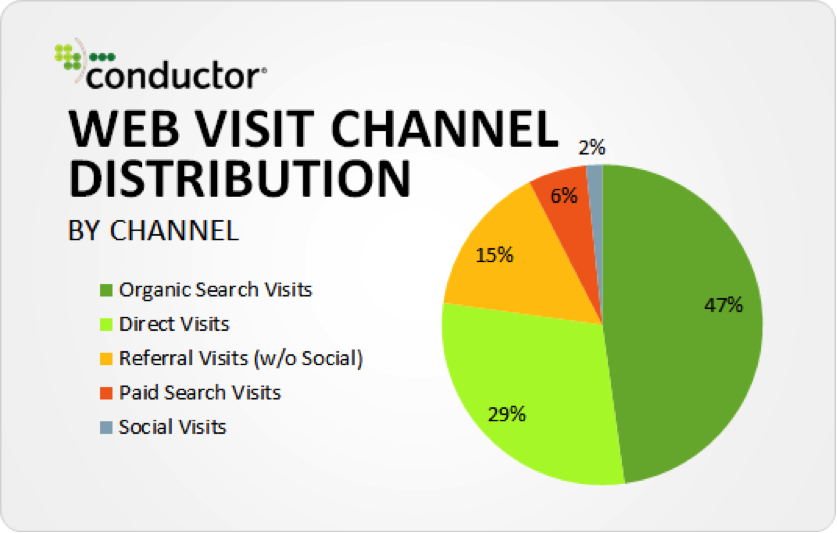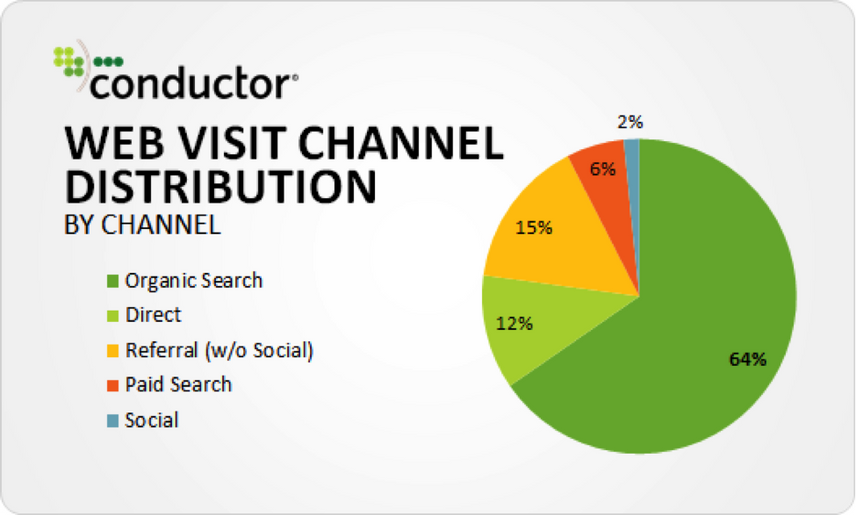Organic Search Is Actually Responsible for 64% of Your Web Traffic
Organic Search was shown to be 47% of visits in the original study; the updated study shows that number to be closer to 64% of website traffic.
Groupon recently published a study showing 60% of their ‘direct’ traffic is actually organic search traffic. With this new finding in mind, Conductor updated an earlier study of 310 million visits and reallocated 60% of the study’s ‘direct’ visits to organic search. The original study showed that 47% of visits were organic search; the updated study suggests that organic search traffic might be responsible for closer to 64% of website traffic.
Lots of interesting content on digital marketing is published every day, but a recent article was amongst one of the most interesting (for many reasons!) I’ve ever read.
In Experiment Shows Up To 60% Of “Direct” Traffic Is Actually Organic Search , Groupon’s Director of Product Management, who heads their organic search, detailed a recent experiment where he completely deindexed Groupon from Google for 6 hours.
He did this, he explained, for the sake of SEO experimentation, and implies that it was done because he and his team suspected that organic search Google Analytics metrics are vastly being undercounted by bucketing a significant portion into the ‘direct visits’ bucket.
After deindexing the site from Google, effectively turning off the spigot of Google traffic, he measured the degree to which direct visits decreased.
The findings: direct visits dropped by 60%. This implies that 60% of direct traffic, is, in fact, organic search traffic.
This implies that 60% of direct traffic, is, in fact, organic search traffic.
The reason for this significant discrepancy is, as the author explains, due to a mix of factors. Here are a few:
- Browsers don’t always accurately report where the visitor came from
- Encryption of website search traffic affects the count
- Older versions of Apple iOs report as ‘direct’
Whatever the reason, it seems clear that Groupon’s research has effectively empirically proven that a very substantial portion of direct traffic is in fact organic search.
Applying Adjusted Allocation to Conductor Research on Web Visit Distribution
We released research not long ago that looked at more than 310 million visits. The study concluded that 47% of traffic came from organic search. Nearly a third (29%) was attributed to direct visits.

Given that insight and data into website traffic’s true breakdown can be hard to come by and given that to my knowledge, an experiment of this kind, is unprecedented, we wanted to see what would happen to our breakdown of web traffic if we were to plug the conclusions of Groupon’s study into our data.
64% of Website Visitors Come from Organic Search
By taking 60% of visits originally attributed to ‘direct’ and reallocating them to ‘organic search’, organic search went from 47% of all visits to 64%. Direct visits dropped from 29% of visits to 12%. This significant discrepancy—17% separates the ‘before’ and ‘after’ allocations should be enough to give marketers pause—and question the assumptions on which their digital strategy lies.

Organic Search is Responsible for a far Greater Percentage of Website Traffic than Originally Thought
The question of what percentage of our overall website traffic comes from organic search is an important one. In fact, there is arguably no single more important piece of information a search practitioner or marketing executive can have in budgeting, headcount or strategy decisions. Improving organic search has implications on not only paid search but now direct even if it is just a tracking measure.
In fact, there is arguably no single more important piece of information a search practitioner or marketing executive can have in budgeting, headcount or strategy decisions.
By plugging Groupon’s research into Conductor’s research on website traffic distribution, it is clear that organic search is likely responsible for a far greater percentage of site traffic than originally thought.







